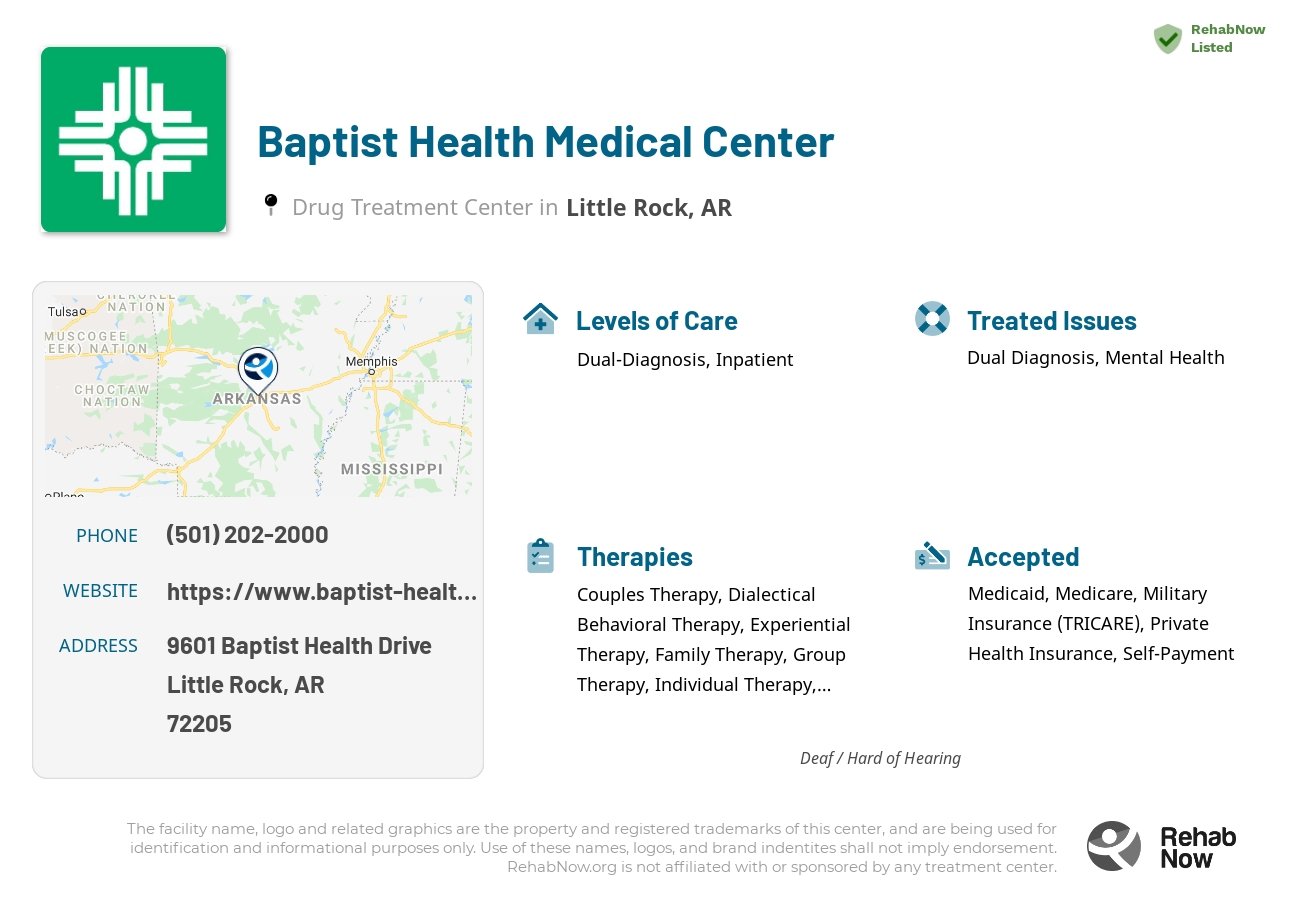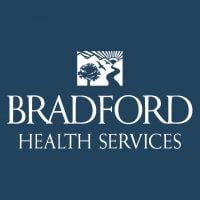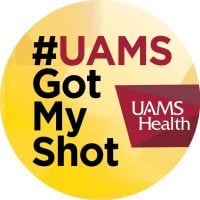Baptist Health Medical Center
Drug Rehab Center in Little Rock, Arkansas
Baptist Health Medical Center in Little Rock provides comprehensive healthcare services, with a focus on primary care, cardiology, orthopedics, and addiction treatment, and is accredited and certified by various organizations for their quality of care.
About Baptist Health Medical Center in Arkansas
Baptist Health Medical Center in Little Rock, Arkansas is one of the leading providers of comprehensive healthcare services in the area. Since it was established in 2002, it has consistently provided high-quality care to the community. It offers a full range of medical services, with a focus on primary care, cardiology, orthopedics, and addiction treatment. They have an extensive network of expert doctors and nurses who are dedicated to providing compassionate care and specialized treatment.
Baptist Health Medical Center in Little Rock provides comprehensive addiction and substance abuse services, including intensive outpatient treatment, medication-assisted treatment, and residential programs. In addition, their credentialed psychiatrists, psychologists, and counselors provide individualized, evidence-based treatment plans and therapeutic interventions. They strive to reduce the stigma of addiction, and provide resources to help individuals and families to heal and rebuild their lives in a safe and supportive environment.
Baptist Health Medical Center is fully accredited by The Joint Commission and is certified by the Arkansas Department of Health as a state-licensed addiction facility. They have also earned a Lung Cancer Screening Certificate of Excellence and a Gold Seal of Approval from the American Heart Association, recognizing their efforts in the prevention and treatment of lung cancer and heart disease. They have also been named a "Best Regional Hospital" by U.S. News and World Report.
Genders
Ages
Modality
Additional
Conditions and Issues Treated
A drug rehab center that uses Dual Diagnosis is more likely to be successful in rehabilitating a person. Dual diagnosis helps to identify and treat any co-occurring disorders. It is essential to screen for both addiction and any untreated mental health issues. A dual diagnosis gives rehab the means to treat addiction while restoring mental and emotional health.
About 70% of patients with drug addiction have at least one other psychiatric diagnosis. Fortunately, dual diagnosis treatment is a proven model that has been highly effective.
Levels of Care Offered
This center offers a variety of custom treatment tailored to individual recovery. Currently available are Dual-Diagnosis, Inpatient, with additional therapies available as listed below.
Inpatient rehab means you live there while your addiction or co-occurring disorder is treated. Prescribed medications are used along with counseling.
This type of rehabilitation provides a drug-free environment for people who struggle with chronic/long-term addiction (or their own home). Jobs or school can be put on hold until after the stay to focus solely on recovery.
Therapies & Programs
During individual therapy at Baptist Health Medical Center in , the person in recovery meets with a therapist one on one to go over their situation and learn from past mistakes. The counselor or therapist will use this time to address the causes of addiction, triggers, and any mental issue or dual diagnosis. They will also address aftercare plans, giving them the best chances of long-term sobriety.
This therapeutic process is very intense and challenging to go through. Some clients may find it easier to open up with someone apart from their family or loved ones who understand their struggles and experience with addiction.
The process of going through couple’s therapy at Baptist Health Medical Center in allows for both partners to be on the same page regarding addiction recovery. Whether one or both members of the couple struggled with addiction, they can improve their odds of sobriety by undergoing this treatment together. This therapeutic environment teaches how to communicate effectively and avoid relapse triggers while building healthy lifestyles that may help maintain sobriety following graduation from rehab programs.
Family therapy is designed to help addicts get clean and sober by using what they love the most; their family. Most drug treatment centers make it mandatory that the addict’s family attend therapy sessions, which is great because having everyone there to support them makes it much easier for them to get clean. Not only are they surrounded by people who want them to get better, but everyone is there because they want the best for them, not because they feel like they have to be.
Drug addicts are often surrounded by resentful or uneducated family members who would, at times, rather see them stay addicted because it makes their own lives easier. Sometimes they don’t understand what the addiction is or how they play a part in it. They know that during and after the addict’s sobriety journey, they will face challenges and changes that they aren’t sure how to handle. This can be very tough for an addict to go through on their own, which is why it’s so important that they have the support of their family. Just because someone is an addict does not mean that they don’t deserve the love and support of those around them.
Addicts in Little Rock, AR can find support in group therapy at Baptist Health Medical Center by finding peers who understand their situation and being held accountable. They also learn to develop faith, understanding, and insight into their addiction through shared conversations.
Group Therapy is employed by drug treatment centers to provide the recovering addict with a platform to talk about their feelings and experiences. It also provides for an opportunity to learn from other addicts who have successfully overcome their addiction. It is recommended that all group members be recovering addicts for this type of therapy to work.
Dialectical behavior therapy (DBT) is a cognitive-behavioral therapy that focuses on eliminating specific negative thoughts, such as suicidal thoughts. These negative thoughts can potentially lead to an individual inflicting self-harm. It helps treat patients exhibiting uncontrollable emotions, intense mood swings, and borderline personality disorders.
The term “Dialectic” means the integration of opposites. In substance abuse, DBT refers to accepting the patient’s addiction and working to change their thoughts and behavior. It improves life skills such as controlling intense emotions without reacting impulsively, resolving interpersonal conflicts effectively, and promoting awareness about self and others.
Cognitive Behavioral Therapy (CBT) helps addicts comprehend the causes of their substance abuse and the consequences that follow. The treatment’s goal is to help addicts gain self-control and maintain abstinence from drugs and alcohol over the long term. Through CBT, clients learn to recognize and avoid high-risk situations and cope with challenging situations when they arise.
Nutrition therapy has been used as a treatment modality for addiction recovery and in eating disorders for adults, adolescents, and children. Specific nutrients have been identified that influence neurotransmitters associated with reward pathways of the brain. Carbohydrate loading with complex carbohydrates to elevate serotonin levels was effective in treating bulimia nervosa. This approach prompted researchers to explore the use of this type of nutritional intervention in other disorders.
Nicotine replacement therapy is a popular method of treatment that helps individuals overcome their addiction to cigarettes by providing them with safer alternatives. Nicotine replacement options can include:
- Inhalers
- Gum
- Patches
These treatments are often used in combination with other therapies, such as cognitive behavioral therapy or motivational interviewing, to help individuals more easily transition into a smoking-free lifestyle.
Patient Experience
Experiential Therapy at Baptist Health Medical Center
Experiential therapy is a type of treatment involving immediate, intense experiences designed to manage addiction. Experiential therapy is beneficial for:
- People who are seeking to overcome an addiction but have difficulty focusing on treatment goals
- People with short attention spans due to high levels of stress or difficulty concentrating
- People who are afraid of engaging in treatment due to negative past experiences
Payment Options Accepted
For specific insurance or payment methods please contact us.
Is your insurance accepted?
Ask an expert, call (888) 674-0062
Baptist Health – Arkansas Associated Centers
Discover treatment facilities under the same provider.
- Baptist Health Medical Center - Little Rock in Little Rock, AR
- Baptist Health Behavioral Health Clinic - North Little Rock in North Little Rock, AR
- Baptist Health Behavioral Health Clinic - Little Rock in Little Rock, AR
Learn More About Baptist Health – Arkansas Centers
Additional Details
Specifics, location, and helpful extra information.
Little Rock, Arkansas 72205 Phone Number(501) 202-2000 Meta DetailsUpdated November 25, 2023
Staff Verified
Baptist Health Medical Center Patient Reviews
There are no reviews yet. Be the first one to write one.
Little Rock, Arkansas Addiction Information
Arkansas has one of the highest rates of substance abuse and addiction in the nation for drug overdoses. Methamphetamines and prescription opioids are by far the most widely abused drugs in the state. Despite the high rates, Arkansas ranked only 25th in the for drug overdose deaths in 2013.
In Little Rock, Arkansas, there are approximately 1,000 people who are admitted to treatment centers for addiction to drugs or alcohol every year. There were 2,721 admissions to publicly funded alcohol and drug treatment programs in Little Rock in 2016. The most commonly reported drugs of abuse were methamphetamine (42%), heroin (26%), and alcohol (22%). Some popular treatment options include inpatient rehab, outpatient rehab, and detox centers.
Treatment in Nearby Cities
- Bentonville, AR (152.5 mi.)
- Dumas, AR (78.1 mi.)
- Wynne, AR (96.3 mi.)
- Yellville, AR (103.9 mi.)
- Lake Village, AR (116.2 mi.)
Centers near Baptist Health Medical Center
The facility name, logo and brand are the property and registered trademarks of Baptist Health Medical Center, and are being used for identification and informational purposes only. Use of these names, logos and brands shall not imply endorsement. RehabNow.org is not affiliated with or sponsored by Baptist Health Medical Center.










